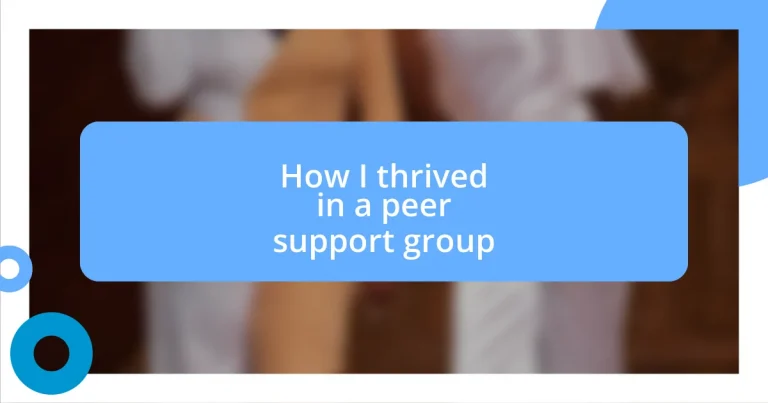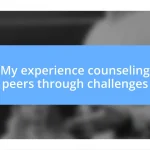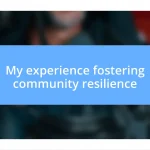Key takeaways:
- Peer support groups foster a sense of belonging and connection through shared experiences, which helps individuals feel less isolated in their struggles.
- Effective communication, characterized by active listening, empathy, and vulnerability, deepens trust and strengthens relationships within the group.
- Setting personal goals within a supportive environment encourages accountability and a shared sense of purpose, contributing to individual growth and community empowerment.
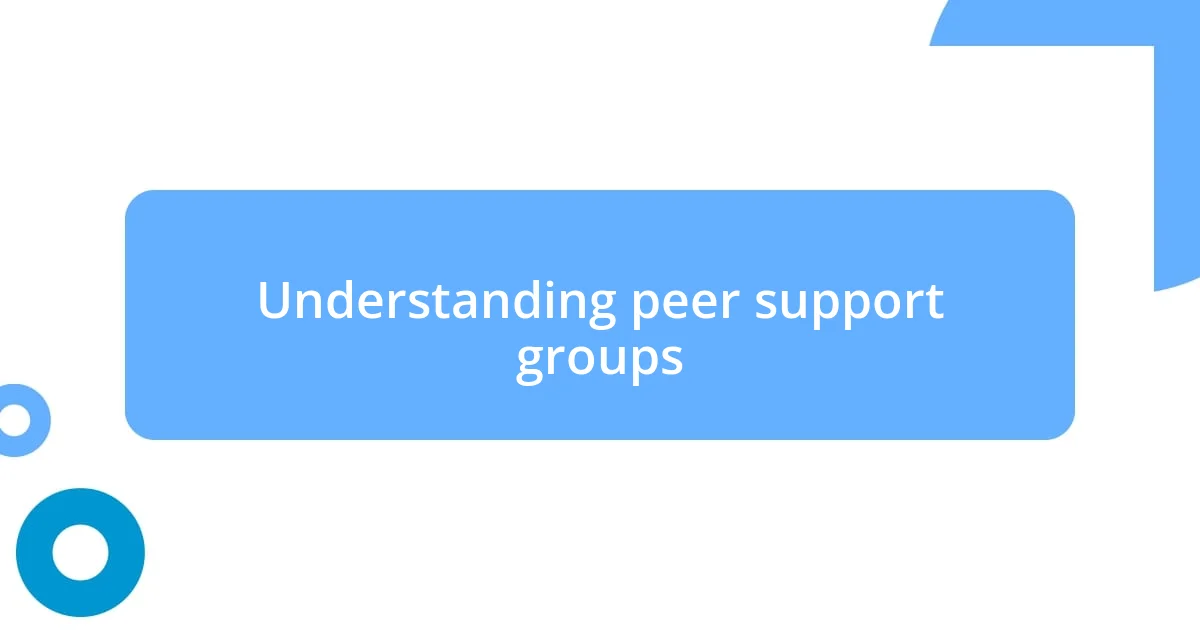
Understanding peer support groups
Peer support groups are unique spaces where individuals come together to share their experiences and challenges without judgment. I remember my first session vividly—walking into a room filled with strangers felt daunting, but I quickly realized that we were all there for a common purpose. Isn’t it refreshing to connect with people who truly understand what you’re going through?
In these groups, vulnerability becomes a strength. I once shared a deeply personal story about my struggles, and watching the faces around me soften in empathy was profound. It made me wonder: how often do we keep our feelings bottled up, fearing judgment? In these supportive environments, sharing burdens feels lighter as others reflect similar experiences, reinforcing the idea that we are not isolated in our struggles.
What I appreciate most about peer support groups is the sense of belonging they foster. During one meeting, a member shared a breakthrough moment they experienced, and it sparked a wave of inspiration among us. Have you ever felt that rush of hope when someone else’s victory resonates with your journey? These interactions emphasize the power of shared narratives, reinforcing our collective resilience while reminding us that healing is often a communal effort.
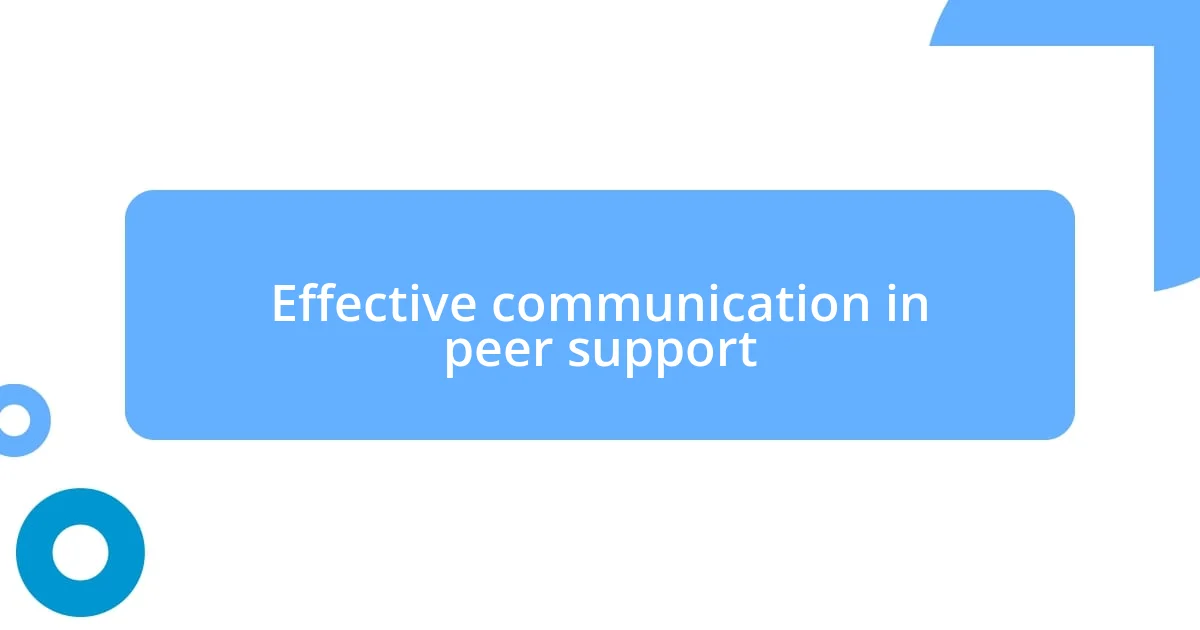
Effective communication in peer support
Effective communication is essential in peer support settings. I learned this firsthand when I realized that listening can be just as powerful as sharing. During one meeting, instead of talking about my own experiences, I focused on validating someone else’s struggles. Watching their demeanor shift as they felt heard was enlightening; it reminded me that sometimes, a caring presence can speak volumes.
- Active listening encourages openness and trust.
- Empathy fosters stronger connections within the group.
- Sharing personal stories creates a space for vulnerability.
- Asking questions can show genuine interest and support.
- Non-verbal communication, like nodding or maintaining eye contact, reinforces understanding.
In my journey, I’ve noticed that effective communication is a two-way street. It’s about not just expressing ourselves but also engaging with others. The more attentive I became to my group members, the more I found that our collective healing deepened. One evening, when a fellow member was struggling to find the right words, I simply shared a moment from my own life that echoed their feelings. That small gesture seemed to lighten their burden, showing me that genuine connection often lies in our shared human experiences.
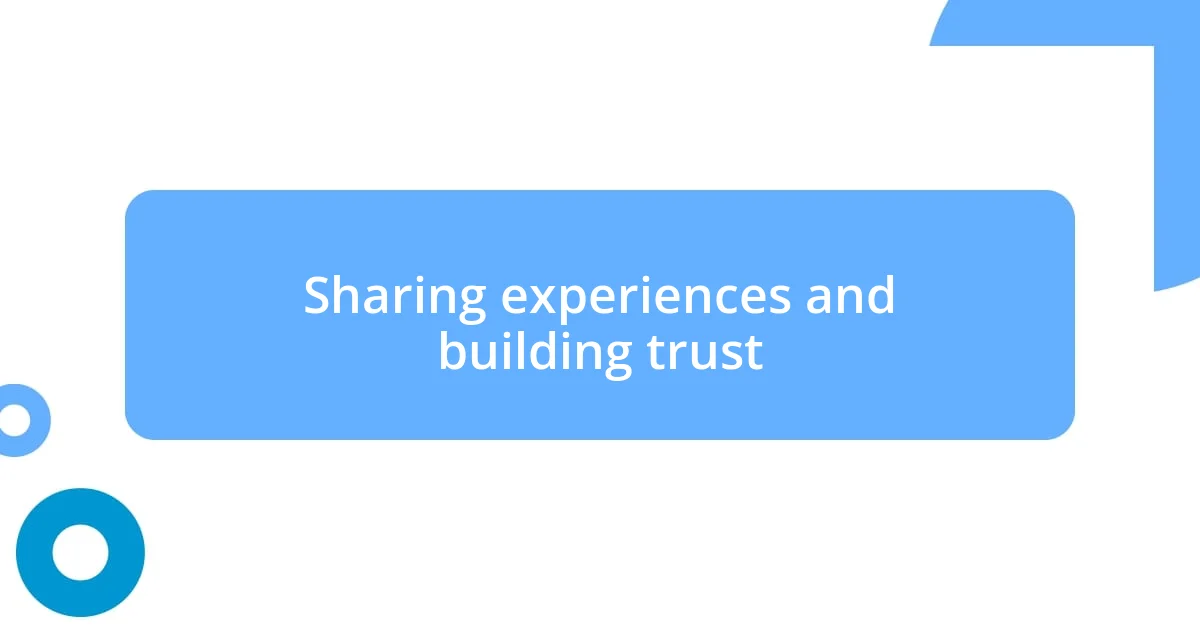
Sharing experiences and building trust
Sharing experiences in a peer support group transforms the atmosphere from mere conversation to something much deeper—an exchange of hope. I remember a specific moment when another member, nervous yet determined, shared their experience of loss. As they spoke, the room seemed to hold its breath. I could feel my own heart racing, remembering my similar pain. It created an unspoken agreement among us: our stories, while unique, echoed the common human experience of grief and healing.
Trust is built in those intimate moments of vulnerability. There was one gathering where I hesitated to share a significant struggle. As I observed others bravely recounting their journeys, I found the courage to open up. The look of understanding and support from my peers made a world of difference. It was evident that vulnerability fosters trust, and I began to realize that by sharing my struggles, I was not only healing myself but also contributing to the healing of others.
Engagement in these discussions is what truly cements connections. I recall a time when we were sharing non-verbal signals, like nods and smiles, which spoke louder than words. Those simple acts of empathy signaled our support for one another. It reinforced the notion that in the realm of peer support, every shared experience is a stepping stone toward building a community grounded in trust and understanding.
| Aspect | Description |
|---|---|
| Sharing Stories | Encourages vulnerability and creates empathy |
| Building Trust | Fosters a safe environment for open dialogue |
| Emotional Connection | Strengthens relationships through shared experiences |

Setting goals within the group
Setting goals within a peer support group is pivotal for establishing a sense of purpose and direction. I remember attending a session where we collectively decided to set weekly goals tied to our personal growth. This practice not only kept us accountable but also ignited a shared ambition. It was inspiring to witness how one person’s goal could empower another; the energy in the room just intensified as we cheered each other on.
Creating individual goals within the group can feel daunting, but it’s a chance to articulate what truly matters to us. During one meeting, we took turns sharing our personal aspirations. I distinctly recall sharing my desire to practice self-compassion daily. The support was palpable, as others began to resonate with my struggle. It was a reminder that we’re not alone in our journeys; our goals reflect our dreams, and having a group to bolster these dreams can truly transform how we feel about them.
It’s important to remember that goals don’t need to be monumental. I once set a simple goal to attend every session for a month. Sounds easy, right? But committing to that routine allowed me to cultivate deeper connections and fostered a sense of belonging. I often ask myself: how can these small steps lead to larger changes? From my experience, even the tiniest efforts can create ripples in our progress, leading us toward profound personal growth and deeper relationships within the group.












